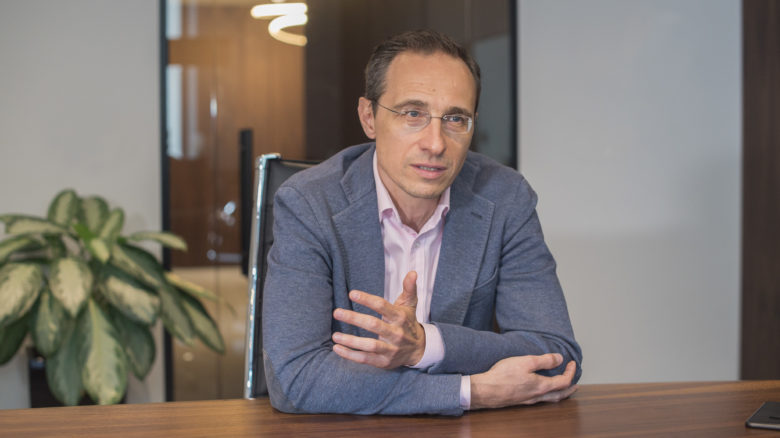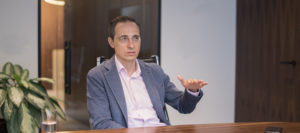Evgeny Angelov: In Many Cases, The Bulgarian VCs Have Subsidised Instead Of Profited From The Funds They Run

Trending Topics is starting a series of interviews with venture capital, private equity, and angel investors from Bulgaria and Eastern Europe, to better understand their mindset, strategies, and put together a well-rounded picture of the industry as it is today. What should the region invest in, what have the EU funds for venture funds accomplished, are there any gaps, and what could be done better. In the next few months, we’ll interview one investor a week to collect as many perspectives as possible.
Evgeny Angelov is mostly associated with the introduction of alternative forms of financing in Bulgaria that led to, among others, the creation of the two early-stage funds Eleven and LAUNCHub some six years ago. At that time he was Deputy Minister of Economy and one of the main architects of the first Bulgarian funds for capital and debt financing of startups. Thanks to these funds, created with European Union financing and private funding, in 2011 Bulgaria had a resource of €350m for equity and loan financing for the business.
Having defended a Master’s degree in Business Administration at Harvard Business School in 2005, Evgeni returned to Bulgaria and headed the regional branch of Trigranit Development Corporation, a leading real estate company in Central and Eastern Europe. He was also part of the boards of Bulgarian Energy Holding (BEH), National Electric Company (NEC). Besides his real estate and energy experience, Angelov has his footprint on the broader innovation ecosystem. He was also part of the management of Sofia Tech Park at the very beginning, a project that was partly initiated by himself too. In addition, he served as Economic Adviser to the President of the Republic of Bulgaria Rosen Plevneliev (2012-2017) and Deputy Minister of Economy (2009-2011).
Today, Angelov continues to be closely connected with the investor world. He is a partner in the investment fund Postscriptum Ventures, which helps regional energy companies to develop innovative solutions for renewable energy, and Chairman of the Bulgarian Venture Capital and Private Equity Association (BVCA), an association of investors and entrepreneurs working to improve the business environment and fostering innovation in the country.
The reason we met Angelov is to talk about his observations on how the VC industry in Bulgaria has developed in the past years, whether it fulfilled his expectations, does he see the issues pointed out by investor Pavel Ezekiev, or on the contrary…
Trending Topics: What is the situation with your current portfolio? How are companies performing?
Evgeny Angelov: Currently, the fund is completely invested and we have nine companies in our portfolio. We invest mostly in energy tech companies. That’s because of the background of the investors in the fund. Our major shareholder, Mark Crandall has a track record in this domain – he co-founded Morgan Stanley’s commodity trading business and he is also the founder and chairman of CWP Renewables, which is a leading developer of renewable energy projects in Europe & Australia.
It all started with wind development and through that experience, we saw that there are significant opportunities for tech solutions in renewables and distributed energy. And so, PostScriptum Ventures was started some 5 years ago as a completely private fund (update: the size of the fund was removed after the article was published due to concerns expressed by some of the investors). We also have three exits so far and are on track to deliver 3x return to investors.
In the previous interview, there was a comment that one of the companies on the local market is part of PostScriptum’s portfolio. How would you explain the situation?
Software Group is a fintech scale-up and is operating in a very competitive space, but we truly believe this company has enormous potential. The recent investments in the company will support its fast growth, as it transitions from mostly licensing to mostly SaaS business model. In the long-run, this is a much better margin business with greater “stickiness” of customers. In the short run, more capital is needed to cover costs and R&D. Usually, companies in this situation have two options: either they decide not to grow or raise another round of capital and invest. You cannot grow from revenues alone and continue to compete with better-funded rivals. This is true for the vast majority of fast-growing, technology companies.
Do you invest separately in startups and companies? What else do you invest in?
I have several investments in tech companies. On an individual level, I have had a mixed experience with very early-stage companies and generally, I think they should be funded institutionally – ie accelerators and seed funds, where the risk can be spread through a larger portfolio. My first three early-stage investments were a total write off. Two of the others are still alive and doing well. Nowadays, I work with more mature companies, where risk and return are more balanced. I like to understand from the outset, how specifically we can support these companies to be successful.
I also like real estate as a sector, where I have spent a big chunk of my professional experience.
What’s the state of the VC industry?
Based on my observations the ecosystem is pretty united, of course, there’s competition, there are some inner conflicts, but they are insignificant. Overall, I think we are in a good place and need to push forward.

What are your investment philosophy and strategy?
They have changed over the years. With time, the focus shifts towards assessing people and their ability to deal with different situations. In the past, I used to spend much more time on product, market, etc., while now I concentrate more on the human element. Of course, we still need to understand the potential of the solution and how many people will pay for it, but good teams will find ways to pivot, re-invent and find a path forward. Perhaps, this is the main reason that we avoid very early-stage ventures: the teams have not been tested, the dynamics and relationships between them are not yet formed. We often see companies with great products and markets that still fail due to interpersonal issues in the team, mostly ego-driven, but also real differences in strategy and approach to challenges. We try to play a balancing, non-confrontational role on the boards of the companies where we are represented.
How much time do you spend with companies?
I spend time regularly with the CEO and maybe some other C-level executives. I don’t think its right for an investor to cross the border of internal hierarchy in the company, this creates toxic dynamics. Sometimes the support is in the form of referrals of new hires, advisors, and clients. I am really opposed to micromanagement – to do it, and to experience it (smiles).
What should local VCs invest in?
There are some really attractive companies, with fantastically talented people, developing products that address global needs. This is particularly true in software, and specifically B2B. We have a competitive advantage, in terms of engineering and should exploit it. B2C is more tricky, as you have to understand consumers deeply – their culture, trends, attitudes etc. – in the large markets like Asia and the US. Outside of technology, I think the agri sector is a great opportunity for Bulgaria to produce high value-added products. Unfortunately, at the moment we are engaged in high-intensity farming and export mostly low margin, commodity products.
From the distance of the time, do you think the funds you’ve created fulfilled their mission and is there now the right mix of investment in the market?
I think the credit really goes to the fund managers themselves. They have done a great job in contributing and furthering the ecosystem in the whole region, not just Bulgaria. When we started structuring the various instruments between 2009 and 2011, we had no idea whether and how it would work out. We never deluded ourselves that 200+ companies will get funded, and they will all be superstars. But if we compare it to grant financing, where hundreds of millions of EU money has been directed in the past 10+ years, what the funds did is, I think, a clear success. Our strategy was to have funding products that address the full life-cycle stages of a company’s life – from start-up to a mature business. We still have work to do in this respect. Now the Fund of Funds is continuing this work. Today we have many early-stage funds, but we don’t have players in the next stage – for companies that are looking for €3-10m in investment. Hopefully, this will no longer be the case soon.
What’s your opinion on the development of the VC industry in Bulgaria in the past years?
In the past five years, we all made mistakes while learning to invest with our first funds. Yet, I see the VC industry maturing, we can see this by the way investors are selecting companies. The level of sophistication of both companies and funds has really evolved over the past few years. We see funds finding their profiles and niches. Specializing in sectors, geographies and deal sizes. For example, Launchub is working closely with a number of diaspora communities. Eleven started with a spray and pray approach, which was a legitimate hypothesis for a time, but is now shifting towards corporate venturing, which seems to make a lot of sense for them.

What are the challenges you see?
One of them is to make the work of private funds more visible and transparent. We report on funds with public money, but don’t really have an overview of the private only funds. What I see as a major step forward is the increasing private commitments and fundraisings in the local funds. This is a major validation of their work and track record.
How could we increase private participation in the local VC industry?
There are currently two things we are doing at BVCA in this respect. Firstly, engaging the Bulgarian diaspora in the US and Western Europe. Secondly, we encourage local institutional investors to take a closer look at the sector and begin making allocations to the funds that resonate with them. Private investors are already in the funds as LPs or part of angel networks. The obvious gap here is the lack of participation of domestic institutional investors. The first step to educate and eliminate any technical hurdles to investment. This is an absolute must.
Foreign investors are also interested to invest alongside local institutions, and when they hear pension funds and insurance companies don’t invest, further conversations become more difficult.
The other natural next step is for the funds to start making crossborder investments We have a critical mass of funds based in Bulgaria now, and they cannot rely on a small market alone, there are simply not enough opportunities for them to choose from. This is a direction we need to work on alongside the government, EIF and the Commission so that local funds are allowed to invest in companies abroad. Then they would have the chance to have some regional significance and more opportunities to fundraise from larger, global LPs. To a certain extent, EIF is now addressing this issue and the next calls for fund managers will be regional.
What do you think about the Fund of Funds? Wasn’t too much time spent in applications for public tenders?
To create such a structure at the level of government is a tough task. One of the main challenges is the necessity of using public procurement in the selection process, which makes the work of the FoF very difficult, as well as for the potential managers. Despite the difficulty, it is absolutely vital that this work continues and I think, given the various constraints, the FoF has delivered several new funds in the past few years, which is very good news for the ecosystem.

Do you think fund managers are currently only after the management fees?
I think it is no secret that some of the people who apply to manage funds are consultants with no investment background, who potentially view these funds as a new form of EU grant money to be “utilized”. This is a big risk, and I think the Fund of Funds as the main LP at the moment is aware of it and taking measures to not flood the market with inexperienced fund managers.
What’s an adequate fee?
We don’t need to reinvent it, the market has developed and proven the “two and twenty” (2% of assets under management, refers to the annual management fee charged by the private equity fund for managing assets. 20 – the standard performance or incentive fee of 20% of profits made by the fund above a certain predefined benchmark. – ed.n.).
Generally, I think it is not a good idea for managers to compete on the level of fees, but on track record, pipeline, strategy. If fees are fixed for everyone than naturally, the emphasis becomes performance. I think the framework under which the FoF and EIF operate, comes from EU regulations on revolving financing, and states in the first two years the fee is 2.5% of the committed capital and 1% of the committed, plus a bit from the invested capital. What does this mean in practice? The fund managers are stimulated to invest everything in the first two years. The investment period should be four years so that the manager is not pushed to invest quickly.
Our VC community is made up of people that really believe in and contribute actively to the ecosystem. In many cases, they have subsidized instead of profited from the funds they run, in order to grow them and make them self sustaining in the future. I really hope the new batch of fund managers continue this tradition of giving back and building upon what has already been done.
Read also:




























